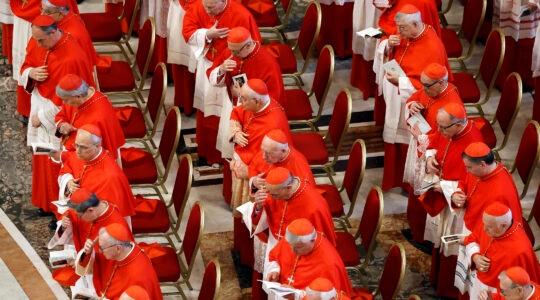MOSCOW, Jan. 20 (JTA) — The Jewish community of Belarus has issued a statement calling on the government to condemn recent anti-Semitic acts in the country. The statement was adopted earlier this month by the Association of Jewish Communities of Belarus, but was only released last week. In the statement, the association said it had reacted with alarm to the ongoing dissemination of anti-Semitic views in the Belarus media. Other manifestations of anti-Semitism that evoked Jewish concerns included last year’s desecrations of two provincial Jewish cemeteries and of the Holocaust memorial in the capital of Minsk. The statement also mentioned anti-Semitic graffiti that occasionally appear in Minsk. The statement came in the wake of an arson attack earlier this month that destroyed the vacation cottage of Mikhail Nordshtein, editor of Aviv, the monthly Jewish newspaper published in Minsk. When vandals daubed a swastika on the Nordshtein’s Minsk apartment a day after the arson attack, Jewish communal leaders believed that both incidents were anti-Semitic acts. But in light of recent disclosures, the leaders now believe that the arson was an act of Mafia-style revenge on the editor’s son, who had borrowed a significant sum for his business and had failed to pay the debt on time. “Whatever the reasons behind the arson, the daubed swastika wounded Nordshtein’s national pride,” Leonid Levin, leader of Belarus’ 100,000-member Jewish community, said in an interview after the statement was published. Despite the recent disclosures about the editor’s son, the arson attack had prompted the Jewish leaders to issue the statement on anti-Semitism. The attack, which has been widely publicized in Belarus and Russia, “involved a well-known activist of our community,” said Levin. “We wanted to use this case to call on the government to condemn anti-Semitism and to ban anti-Jewish propaganda in Belarus.” At the same time, Levin said he did not believe that anti-Semitism was on the rise in Belarus. By raising the issue of anti-Semitism in its statement, the Jewish community wanted to remind the authorities that “the state should support” the Jewish community and “defend its rights,” said Levin. Jewish leaders have traditionally been reluctant to speak about anti-Semitism or any special Jewish concerns, particularly after a controversial November referendum gave President Alexander Lukashenko virtually unlimited powers. In past months, he has cracked down on the opposition and curbed civil liberties, prompting outrage from human rights watchers.
JTA has documented Jewish history in real-time for over a century. Keep our journalism strong by joining us in supporting independent, award-winning reporting.





